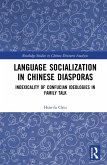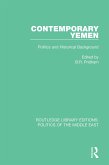Hsin-Fu Chiu
Language Socialization in Chinese Diasporas (eBook, ePUB)
Indexicality of Confucian Ideologies in Family Talk
42,95 €
42,95 €
inkl. MwSt.
Sofort per Download lieferbar

21 °P sammeln
42,95 €
Als Download kaufen

42,95 €
inkl. MwSt.
Sofort per Download lieferbar

21 °P sammeln
Jetzt verschenken
Alle Infos zum eBook verschenken
42,95 €
inkl. MwSt.
Sofort per Download lieferbar
Alle Infos zum eBook verschenken

21 °P sammeln
Hsin-Fu Chiu
Language Socialization in Chinese Diasporas (eBook, ePUB)
Indexicality of Confucian Ideologies in Family Talk
- Format: ePub
- Merkliste
- Auf die Merkliste
- Bewerten Bewerten
- Teilen
- Produkt teilen
- Produkterinnerung
- Produkterinnerung

Bitte loggen Sie sich zunächst in Ihr Kundenkonto ein oder registrieren Sie sich bei
bücher.de, um das eBook-Abo tolino select nutzen zu können.
Hier können Sie sich einloggen
Hier können Sie sich einloggen
Sie sind bereits eingeloggt. Klicken Sie auf 2. tolino select Abo, um fortzufahren.

Bitte loggen Sie sich zunächst in Ihr Kundenkonto ein oder registrieren Sie sich bei bücher.de, um das eBook-Abo tolino select nutzen zu können.
This book provides ethnographically informed analyses of indigenous kin interactions in three Chinese diasporic households in LA. Drawing upon the approach that regards talk as a form of social practice, it demonstrates different ways in which relationships are indigenously orchestrated by Chinese parents and their American-born children.
- Geräte: eReader
- mit Kopierschutz
- eBook Hilfe
Andere Kunden interessierten sich auch für
![Language Socialization in Chinese Diasporas (eBook, PDF) Language Socialization in Chinese Diasporas (eBook, PDF)]() Hsin-Fu ChiuLanguage Socialization in Chinese Diasporas (eBook, PDF)42,95 €
Hsin-Fu ChiuLanguage Socialization in Chinese Diasporas (eBook, PDF)42,95 €![Intermediate Quantities (eBook, ePUB) Intermediate Quantities (eBook, ePUB)]() Philip PetersonIntermediate Quantities (eBook, ePUB)35,95 €
Philip PetersonIntermediate Quantities (eBook, ePUB)35,95 €![Korean Wave in World Englishes (eBook, ePUB) Korean Wave in World Englishes (eBook, ePUB)]() Brittany Khedun-BurgoineKorean Wave in World Englishes (eBook, ePUB)44,95 €
Brittany Khedun-BurgoineKorean Wave in World Englishes (eBook, ePUB)44,95 €![The Linguistics Wars (eBook, ePUB) The Linguistics Wars (eBook, ePUB)]() Randy Allen HarrisThe Linguistics Wars (eBook, ePUB)19,95 €
Randy Allen HarrisThe Linguistics Wars (eBook, ePUB)19,95 €![Re-contextualising East Central European History (eBook, ePUB) Re-contextualising East Central European History (eBook, ePUB)]() Robert PyrahRe-contextualising East Central European History (eBook, ePUB)44,95 €
Robert PyrahRe-contextualising East Central European History (eBook, ePUB)44,95 €![Language and Identity in the Arab World (eBook, ePUB) Language and Identity in the Arab World (eBook, ePUB)]() Language and Identity in the Arab World (eBook, ePUB)42,95 €
Language and Identity in the Arab World (eBook, ePUB)42,95 €![Contemporary Yemen (eBook, ePUB) Contemporary Yemen (eBook, ePUB)]() Contemporary Yemen (eBook, ePUB)33,95 €
Contemporary Yemen (eBook, ePUB)33,95 €-
-
-
This book provides ethnographically informed analyses of indigenous kin interactions in three Chinese diasporic households in LA. Drawing upon the approach that regards talk as a form of social practice, it demonstrates different ways in which relationships are indigenously orchestrated by Chinese parents and their American-born children.
Dieser Download kann aus rechtlichen Gründen nur mit Rechnungsadresse in A, B, BG, CY, CZ, D, DK, EW, E, FIN, F, GR, HR, H, IRL, I, LT, L, LR, M, NL, PL, P, R, S, SLO, SK ausgeliefert werden.
Produktdetails
- Produktdetails
- Verlag: Taylor & Francis eBooks
- Seitenzahl: 210
- Erscheinungstermin: 16. September 2021
- Englisch
- ISBN-13: 9781000434224
- Artikelnr.: 62373297
- Verlag: Taylor & Francis eBooks
- Seitenzahl: 210
- Erscheinungstermin: 16. September 2021
- Englisch
- ISBN-13: 9781000434224
- Artikelnr.: 62373297
- Herstellerkennzeichnung Die Herstellerinformationen sind derzeit nicht verfügbar.
Hsin-fu Chiu is Associate Professor of Chinese at the California State University, Los Angeles. Trained at the University of California, Los Angeles, Dr. Chiu is a conversation/discourse analyst, interactional sociolinguist, and linguistic anthropologist. For him, human sociality and cognitive processes do not exist within the individual, but rather across symbolically mediated interactions among members of a social group. To document trajectories of human development, Dr. Chiu employs a range of qualitative methods (including participation observation, sociolinguistic interviews, video-recording, and analysis of textual documents) and conducts his research on language socialization in Chinese diasporas and second/foreign language acquisition of Chinese in the classroom and beyond.
Figures
Tables
Illustrations
Excerpts
Preface
Acknowledgements
I. Theoretical Standpoint, Methodology, and Ethnography of Data Corpus
1. Theoretical standpoints
1.1 Overview of the book
1.2 Bourdieusian approach second language acquisition in the transnational
context
1.3 Language socialization as a conceptual paradigm
1.4 Participation framework
1.5 Conversation analysis as an analytic apparatus
1.6 Outline of the book
2. Ethnography of participating families
2.1 Collection of digital data
2.2 Ethnography of participating families
2.2.1 The Culver City Family (A)
2.2.2 The Pasadena Family (B)
2.2.3 The Diamond Bar Family (C)
2.3 Transcription of digital data
2.4 Points of departure for analyses
II. Becoming a Member of Chinese Diasporas in the U.S.
3. Power Asymmetry as Process of Socialization to Filial Piety and
Obedience
3.1 Introduction
3.2 Interdisciplinary approach to power in interaction
3.3 Co-construction of authoritarian practices
3.3.1 Actions of deference by Children
3.3.2 Mitigated moves of resistance against privilege denials
3.3.3 Compliance adjacent to effective power
3.3.4 Conditional threats as aggravated words of control
3.4 Co-construction of authoritative practices
3.4.1 Actions that threaten parental esteem
3.4.2 Recycles of commands
3.4.3 Shepherding as aggravated embodied control
3.5 Concluding remarks
4. Epistemic Asymmetry as Process of Socialization to Humbleness and Shame
4.1 Introduction
4.2 Membership categorization, positioning, and socialization to identity
4.2.1 From negativity to interdependent self
4.3.1 Positive assessable values downplayed
4.3.2 Negative assessable as a joint focus of attention
4.3.3 Epistemic asymmetry underscored over actions of contrast
4.4 Socialization techniques in the shame-socialized culture
4.5 Socialization to individualistic self-esteem
4.6 Concluding remarks
III. Indexical Ideologies of Confucian Thoughts
5. Interpersonal Selflessness as the Basis for Harmonious Kin Relations
5.1 An issue with competing opinions
5.2 Socialization to the interpersonal self
5.3 Co-constriction of harmonious kin relations
5.3.1 Embodied displays of adoration in parent-child relations
5.3.2 Embodied displays of cohesion among siblings
5.4 Harmony kin relations in disguise
5.5 Concluding remarks
6. Conclusion and Discussion
6.1 A recap of the major findings
6.2 Indexical orders of Confucian ideologies
6.3 Implications for heritage-language socialization and instruction
Bibliography
Index
Tables
Illustrations
Excerpts
Preface
Acknowledgements
I. Theoretical Standpoint, Methodology, and Ethnography of Data Corpus
1. Theoretical standpoints
1.1 Overview of the book
1.2 Bourdieusian approach second language acquisition in the transnational
context
1.3 Language socialization as a conceptual paradigm
1.4 Participation framework
1.5 Conversation analysis as an analytic apparatus
1.6 Outline of the book
2. Ethnography of participating families
2.1 Collection of digital data
2.2 Ethnography of participating families
2.2.1 The Culver City Family (A)
2.2.2 The Pasadena Family (B)
2.2.3 The Diamond Bar Family (C)
2.3 Transcription of digital data
2.4 Points of departure for analyses
II. Becoming a Member of Chinese Diasporas in the U.S.
3. Power Asymmetry as Process of Socialization to Filial Piety and
Obedience
3.1 Introduction
3.2 Interdisciplinary approach to power in interaction
3.3 Co-construction of authoritarian practices
3.3.1 Actions of deference by Children
3.3.2 Mitigated moves of resistance against privilege denials
3.3.3 Compliance adjacent to effective power
3.3.4 Conditional threats as aggravated words of control
3.4 Co-construction of authoritative practices
3.4.1 Actions that threaten parental esteem
3.4.2 Recycles of commands
3.4.3 Shepherding as aggravated embodied control
3.5 Concluding remarks
4. Epistemic Asymmetry as Process of Socialization to Humbleness and Shame
4.1 Introduction
4.2 Membership categorization, positioning, and socialization to identity
4.2.1 From negativity to interdependent self
4.3.1 Positive assessable values downplayed
4.3.2 Negative assessable as a joint focus of attention
4.3.3 Epistemic asymmetry underscored over actions of contrast
4.4 Socialization techniques in the shame-socialized culture
4.5 Socialization to individualistic self-esteem
4.6 Concluding remarks
III. Indexical Ideologies of Confucian Thoughts
5. Interpersonal Selflessness as the Basis for Harmonious Kin Relations
5.1 An issue with competing opinions
5.2 Socialization to the interpersonal self
5.3 Co-constriction of harmonious kin relations
5.3.1 Embodied displays of adoration in parent-child relations
5.3.2 Embodied displays of cohesion among siblings
5.4 Harmony kin relations in disguise
5.5 Concluding remarks
6. Conclusion and Discussion
6.1 A recap of the major findings
6.2 Indexical orders of Confucian ideologies
6.3 Implications for heritage-language socialization and instruction
Bibliography
Index
Figures
Tables
Illustrations
Excerpts
Preface
Acknowledgements
I. Theoretical Standpoint, Methodology, and Ethnography of Data Corpus
1. Theoretical standpoints
1.1 Overview of the book
1.2 Bourdieusian approach second language acquisition in the transnational
context
1.3 Language socialization as a conceptual paradigm
1.4 Participation framework
1.5 Conversation analysis as an analytic apparatus
1.6 Outline of the book
2. Ethnography of participating families
2.1 Collection of digital data
2.2 Ethnography of participating families
2.2.1 The Culver City Family (A)
2.2.2 The Pasadena Family (B)
2.2.3 The Diamond Bar Family (C)
2.3 Transcription of digital data
2.4 Points of departure for analyses
II. Becoming a Member of Chinese Diasporas in the U.S.
3. Power Asymmetry as Process of Socialization to Filial Piety and
Obedience
3.1 Introduction
3.2 Interdisciplinary approach to power in interaction
3.3 Co-construction of authoritarian practices
3.3.1 Actions of deference by Children
3.3.2 Mitigated moves of resistance against privilege denials
3.3.3 Compliance adjacent to effective power
3.3.4 Conditional threats as aggravated words of control
3.4 Co-construction of authoritative practices
3.4.1 Actions that threaten parental esteem
3.4.2 Recycles of commands
3.4.3 Shepherding as aggravated embodied control
3.5 Concluding remarks
4. Epistemic Asymmetry as Process of Socialization to Humbleness and Shame
4.1 Introduction
4.2 Membership categorization, positioning, and socialization to identity
4.2.1 From negativity to interdependent self
4.3.1 Positive assessable values downplayed
4.3.2 Negative assessable as a joint focus of attention
4.3.3 Epistemic asymmetry underscored over actions of contrast
4.4 Socialization techniques in the shame-socialized culture
4.5 Socialization to individualistic self-esteem
4.6 Concluding remarks
III. Indexical Ideologies of Confucian Thoughts
5. Interpersonal Selflessness as the Basis for Harmonious Kin Relations
5.1 An issue with competing opinions
5.2 Socialization to the interpersonal self
5.3 Co-constriction of harmonious kin relations
5.3.1 Embodied displays of adoration in parent-child relations
5.3.2 Embodied displays of cohesion among siblings
5.4 Harmony kin relations in disguise
5.5 Concluding remarks
6. Conclusion and Discussion
6.1 A recap of the major findings
6.2 Indexical orders of Confucian ideologies
6.3 Implications for heritage-language socialization and instruction
Bibliography
Index
Tables
Illustrations
Excerpts
Preface
Acknowledgements
I. Theoretical Standpoint, Methodology, and Ethnography of Data Corpus
1. Theoretical standpoints
1.1 Overview of the book
1.2 Bourdieusian approach second language acquisition in the transnational
context
1.3 Language socialization as a conceptual paradigm
1.4 Participation framework
1.5 Conversation analysis as an analytic apparatus
1.6 Outline of the book
2. Ethnography of participating families
2.1 Collection of digital data
2.2 Ethnography of participating families
2.2.1 The Culver City Family (A)
2.2.2 The Pasadena Family (B)
2.2.3 The Diamond Bar Family (C)
2.3 Transcription of digital data
2.4 Points of departure for analyses
II. Becoming a Member of Chinese Diasporas in the U.S.
3. Power Asymmetry as Process of Socialization to Filial Piety and
Obedience
3.1 Introduction
3.2 Interdisciplinary approach to power in interaction
3.3 Co-construction of authoritarian practices
3.3.1 Actions of deference by Children
3.3.2 Mitigated moves of resistance against privilege denials
3.3.3 Compliance adjacent to effective power
3.3.4 Conditional threats as aggravated words of control
3.4 Co-construction of authoritative practices
3.4.1 Actions that threaten parental esteem
3.4.2 Recycles of commands
3.4.3 Shepherding as aggravated embodied control
3.5 Concluding remarks
4. Epistemic Asymmetry as Process of Socialization to Humbleness and Shame
4.1 Introduction
4.2 Membership categorization, positioning, and socialization to identity
4.2.1 From negativity to interdependent self
4.3.1 Positive assessable values downplayed
4.3.2 Negative assessable as a joint focus of attention
4.3.3 Epistemic asymmetry underscored over actions of contrast
4.4 Socialization techniques in the shame-socialized culture
4.5 Socialization to individualistic self-esteem
4.6 Concluding remarks
III. Indexical Ideologies of Confucian Thoughts
5. Interpersonal Selflessness as the Basis for Harmonious Kin Relations
5.1 An issue with competing opinions
5.2 Socialization to the interpersonal self
5.3 Co-constriction of harmonious kin relations
5.3.1 Embodied displays of adoration in parent-child relations
5.3.2 Embodied displays of cohesion among siblings
5.4 Harmony kin relations in disguise
5.5 Concluding remarks
6. Conclusion and Discussion
6.1 A recap of the major findings
6.2 Indexical orders of Confucian ideologies
6.3 Implications for heritage-language socialization and instruction
Bibliography
Index







